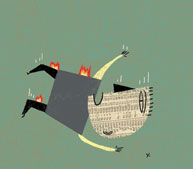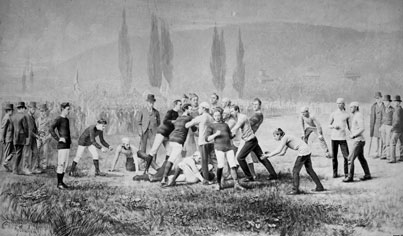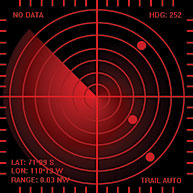Letters
Great But Late
I've been receiving the News for years. I recently received the spring edition and cannot remember a better issue. I read it from cover to cover. Thank you very much. I don't understand, however, why the spring issue arrived in summer and the summer issue may reach here in autumn. Can this be rectified somehow?
Harvey Schneider, BA'65, MA'69
Mevasseret Zion, Israel
Ed. note: To get the best rate possible for bulk mailing of the News, we rank low-ish on the Canada Post totem pole, which means that regular mail takes priority and that for international destinations, airmail is out of the question. The News is shipped to Europe and redistributed from there, accounting for the season-long lag.
Important Oversight
I was pleased to see a full page devoted to "Giving Back to Mac" in the summer issue. Too often, the importance of Macdonald College is overlooked. In particular, the diploma course for farmers and the School for Teachers have been forgotten or ignored. These two programs formed the main student body at Mac before WWII, but were not degree granting. They were a much larger population than the four years of the Aggies and Home Ecs.
I attended the School for Teachers in 1938-39, one of the largest teacher class populations in the school's history. The graduates were the main source of teachers for elementary grades, both in country schools and larger town and city schools. Only within the past several years were any of these people invited to class reunions. I was invited, as I had received an MEd in 1970 from McGill for courses taken at Macdonald. It was only after WWII that teaching certificate requirements included a university degree.
Few people, including the McGill administration, seem to know that the original founding of Macdonald was to provide teachers for elementary schools in the non-urban areas of the province and to give young farm workers some of the growing knowledge of scientific and productive farming. These people are ignored, yet for years they comprised a vital section of both rural and urban work forces.
Not only did I receive training for post-war work, but I met my wife, also a teacher in training. Like many Mac teacher grads, we put in many years educating young people in Quebec. At times it was an arduous task but very rewarding from an emotional point of view
H.R.K. West, MEd'70
Pointe-Claire, Que.
Hail to the Chief
I read your article in the summer edition, "Wrong Read on Reagan." It was a delight to have a McGill History professor extolling "the Gipper." As an American, I am delighted to see credit given where credit is due. In my view, Reagan was one of the greatest, if not the greatest president, America ever had. He was universally liked by Americans of all political persuasions. His "Weltanschauung" was superbly grounded.
Contrary to your article, he did not always "do business" with the Soviets; his refusal to shake hands with Gorbachev at the conclusion of the summit at Reykjavik to agree on arms limitations was indicative of Reagan's refusal to capitulate in order to promote a feeling of harmony for political advantage.
The world owes a great debt to Reagan. He was instrumental in the downfall of the Soviet Union. As president he made mistakes, but which of our presidents have not? However, his legacy is assured. Here was a President; whence comes such another?
Frank Meier, BEng'51
Osprey, Florida
Hard on Harvey, er Henry
I read "Fall from Grace" in the last issue.

© Images.com/CORBIS
As one of the wrong people trained the wrong way for the wrong reasons, I'd like to pause briefly from my campaign of swaggering incompetence and remark that to many of McGill's MBAs, Harvey [sic] Mintzberg is the crazy uncle hidden up in the attic: not taken very seriously, at times a little embarrassing, and only discussed sotto voce when the other grownups have left.
Mintzberg's work is an ongoing study in casual empiricism; casting aspersions against any broadly defined collective (whether ethnic groups in bell curves, kitten-eating lawyers, or even ivory tower contrarians) is hardly the work of a serious scholar. Come down from your office, Harvey, and chat with MBA students. After all, "leaders are supposed to engage others," not fling invective from the cozy confines of one's bunker. You might even learn something.
Mateo Ayala, MBA'97
via email
War Stories
I enjoy the News, which you send to my wife, Gudrun Schulz Neumann, BCom'81. On page 9 of the last issue in "McGill Remembers" you mention R.C. Fetherstonhaugh's book McGill University at War. Do you know of any books or other materials on McGill alumni or students in World War I, 1914-1918? Does Mr. Fetherstonhaugh cover any of WWI in McGill University at War?
My family (Neumann) lived in Montreal two blocks east of the campus on Alymer Street, in what is now the "McGill Ghetto." My great-grandfather was born and spent his first 18 years there. I would very much like to check the names of the WWI participants for friends of my family. My great-grandfather went to the States at age 18 and served in the U.S. Army. Could you possibly direct me to some publications which talk about the WWI period involving McGill and Montreal?
Many thanks,
Chester Neumann
Kansas City, Mo.
Ed. note: R.C. Fetherstonhaugh, was editor of the McGill News in the late 1920s, then served for many years on the magazine's editorial board. As World War II started, he began compiling information for the News on McGill personnel in the armed forces, a service he kept up until 1946. His book is an exhaustive history of McGill's contributions to both world wars, including in research, medical support and government policy. The McGill Honour Roll 1914-1918, published by the University in 1926, lists all McGill faculty, students and alumni in the armed forces, and also indicates their division and any medals received.
Each soldier killed at war is honoured with a photograph and brief biography. The book is out of print but can be consulted via the McGill University Archives, (514) 398-3772 or refdesk.archives@mcgill.ca, or requested through your local library as an interlibrary loan from McGill's Osler Library.

McGill Archives
Historical Correction
Although a mere BSc'51, I must correct the learned gentlemen who contributed the Epilogue in the summer edition. They were wrong in inferring that there had been no Harvard-McGill game since 1874. I was there when the McGill "English Rugby" team resumed the rivalry in 1949. Harvard had just returned from their annual tour of Bermuda and were fighting fit, while we had made do with a run around the Currie Gym. We lost.
I cannot remember whether we had a return game in '50, but we certainly played MIT in Molson Stadium. I believe we were only allowed to do this because we were respectably dressed. By this time we had received some recognition by the Athletics Department, and enough money for me to send to England for proper rugby kit (red shirts, white shorts). Until then we made do with a mixture of personal kit and cast-off t-shirts, most of which were a washed-out red.
By the 1950-51 season we had been accepted as a minor sport, dropped the "English" and had had a coach appointed by Vic Obeck, one Howie Ryan. We finished the year as Eastern Canadian Champions and were awarded silver Maple Leaf blazer badges, and me - the manager - a big M.
Apart from its role in the birth of football, McGill helped keep alive the spirit of Rugby Football in Canada. The game was played in a small way in other parts of the country, but I like to think that it was our games with the likes of Westmount and U of T on cold and wet afternoons in Westmount Park that encouraged some post-war immigrant Brits to form the Toronto Wanderers. Interest in the game spread until now we have - and who would have countenanced it then - international status in Canada.
I am surprised the Harvard-McGill travesty has not been corrected before. Where are you Glen, Fairweather, Alexander, Floyer, Morgan? Over the years I have tried, writing to "McGill Rugby" via the Graduates' Society, even enclosing photographs, without receiving a reply. Better luck this time, perhaps?
A.G. Johnstone, BSc'51
Diss, England
Radio to Radar

istockphoto.com
Regarding the Fact File on page 10 of the summer issue, the 500 men you refer to (Canadians and Americans) were trained at McGill in basic radio physics and electronics in preparation for secret training by the RAF in Clinton, Ont., as radar technicians.
I took this McGill course in the autumn of 1941 and, at that time, we RCAF airmen were all housed and fed in the United Theological College on University Avenue, a convenient two-minute walk from my old fraternity house (Delta Sigma Phi) farther up University.
Dr. Keys did an outstanding job! He didn't spare himself. Incidentally, I received my commission in 1942 and served as an RCAF radar officer attached to the RAF in the United Kingdom, India and Ceylon until the summer of 1945.
See you shortly at my 65th anniversary of graduation!
George K. Grand, BA'40
Ottawa, Ont.
Graduate's Good Deed
You have done a splendid job of making McGill News a magazine which I look forward to reading (not always the case in the past). I am continually picking up bits of my own past (and pleasant) memories of McGill. For example, I was pleased to read about the Lloyd Carr-Harris String Quartet in the latest issue. I graduated in the same year and I remember him very well.
I also wished to tell you about a "rare" find. Last fall, attending a rummage sale at a local church, I happened upon a 1673 publication, Roman Forgeries, by Thomas Traherne, which was clearly a McGill library book (it even had an insert sheet, showing the last time it left the library - sometime in the 1930s as I recall). Although the author's name was not shown anywhere, I did have some recollection about Traherne, and managed to confirm it in a supplement to the Dictionary of National Biography.
I returned the book to McGill in January and it was acknowledged by David McKnight, the acting curator of rare books. I was left with the impression it was an interesting story, although perhaps in a rather limited way.
Gerald McCaughey, BA'51
Victoria, B.C.
Ed. note: David McKnight advises that the Traherne book disappeared from a collection donated to McGill by Judge Robert Mackay, a prominent 19th-century Montreal jurist and collector who served on McGill's Board of Governors in the 1880s. The story of Thomas Traherne involves a number of fortuitous discoveries. Roman Forgeries, a theological work, was the only one published during his lifetime (1635-1674), but manuscripts discovered at a London bookstall and the British Museum in 1897 established his reputation as a metaphysical poet. A hundred years later, two new manuscripts turned up in libraries in Washington, D.C., and London, sparking renewed critical interest in Traherne. According to a recent article in the Anglican Theological Review, he's "poised to have a significant influence on Christian thinking in this new century."
Generous Gesture
In a letter in the summer issue of the News, I asked if anyone could replace a lost McGill ring for my mother, Edna Beatrice (Rettie) MacRae, who graduated with a Bachelor of Household Sciences from Macdonald in 1940. The ring style was quite specific, with pearls and ruby-like stones. Now 88, mom lost her ring many years ago but never gave up hope of finding another one.
A few weeks ago I heard from the widow of a doctor who said she still had her late husband's McGill ring. Her description sounded exactly like what I was looking for. This kind lady, also a McGill graduate, mailed it to me and when I opened the box I couldn't see the ring for the tears in my eyes. When I told mom, she was absolutely delighted.
My thanks to all who shared an interest in helping me find the ring, and a very special thanks to the kind person who made my mother's long-held wish come true.
Liz MacRae
Pointe-Claire, Que.


